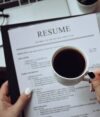Now we get into the meat and potatoes of the resume, which is your work experience and skill set. Your goal is to show your relevant work experience and how it matches the job description to which you are applying.
We review dozens of resumes every week, and we usually see a few consistent problems when we get to this part of the resume.
Be sure to tailor your resume to the specific position you are considering. Make sure your resume reflects the keywords that are also in the job description. You want to showcase your skills, accomplishments, and experience clearly and concisely.
Think of it from the hiring manager’s perspective. Based on the position requirements listed in the job description, does your resume reflect all of the necessary information to show you could be a strong candidate?
Years ago, we had a very strong marketing expert candidate. He progressed through his career in various marketing roles until he reached the VP level.
His resume was excellent, and he was a very marketable candidate.
He called us one day and was very frustrated after applying for many positions and not getting a response. After a brief discussion, he told us that he had applied only for senior sales roles and shared a job description for one.
When we reviewed it together, it was obvious that his resume didn’t reflect any of the information required by the job description.

Obviously, in resume writing, grammar is critical. We’ve seen numerous resumes where we must call out grammar issues and typos.
Triple-check your work and have a friend review it as well.
If you are just starting in the workforce, your resume will probably only one page, but regardless of your number of years of experience, we don’t like to see a resume longer than two pages.
Also, if you have recently graduated, you would want your education listed at the top of the resume. If you have more than ten years of experience, consider listing it at the bottom. However, if you have recently completed an advanced degree, we suggest moving your education information to the top near your contact information.
These are a few ideas that might help you tweak your resume for your next career move. Remember that there is no right way, and each resume needs to be catered to the position you are considering.
Your resume not only needs to show that you are capable and qualified to perform the duties of the job description, it also needs to show why you are better qualified than other applicants.
Remember writing a resume is an art and a science, and getting it right is important to land the job you want. If you follow these guidelines, you’ll have a resume that will stand out among the competition and help you on your way to success. For more advice on how to take your career to the next level, join our talent pool today!
The length of your resume should depend on your level of experience and the job you are applying for. In general, a one-page resume is ideal for entry-level or junior positions, while a two-page resume may be more appropriate for mid-level or senior roles. However, it’s important to prioritize quality over quantity. Your resume should be concise and easy to read, regardless of its length.
– Review the job description carefully: Highlight the skills and qualifications that are most important for the job.
– Customize your summary statement: Use the job description to guide the language and tone of your summary statement.
– Highlight relevant experience: Focus on work experience that is most relevant to the job you are applying for, and be sure to highlight any relevant achievements.
Be first in line for the best job opportunities in your field!
Match Point Recruiting is a boutique executive search firm in Bentonville, AR
Follow us on LinkedIn Match Point Recruiting
Subscribe to our newsletter